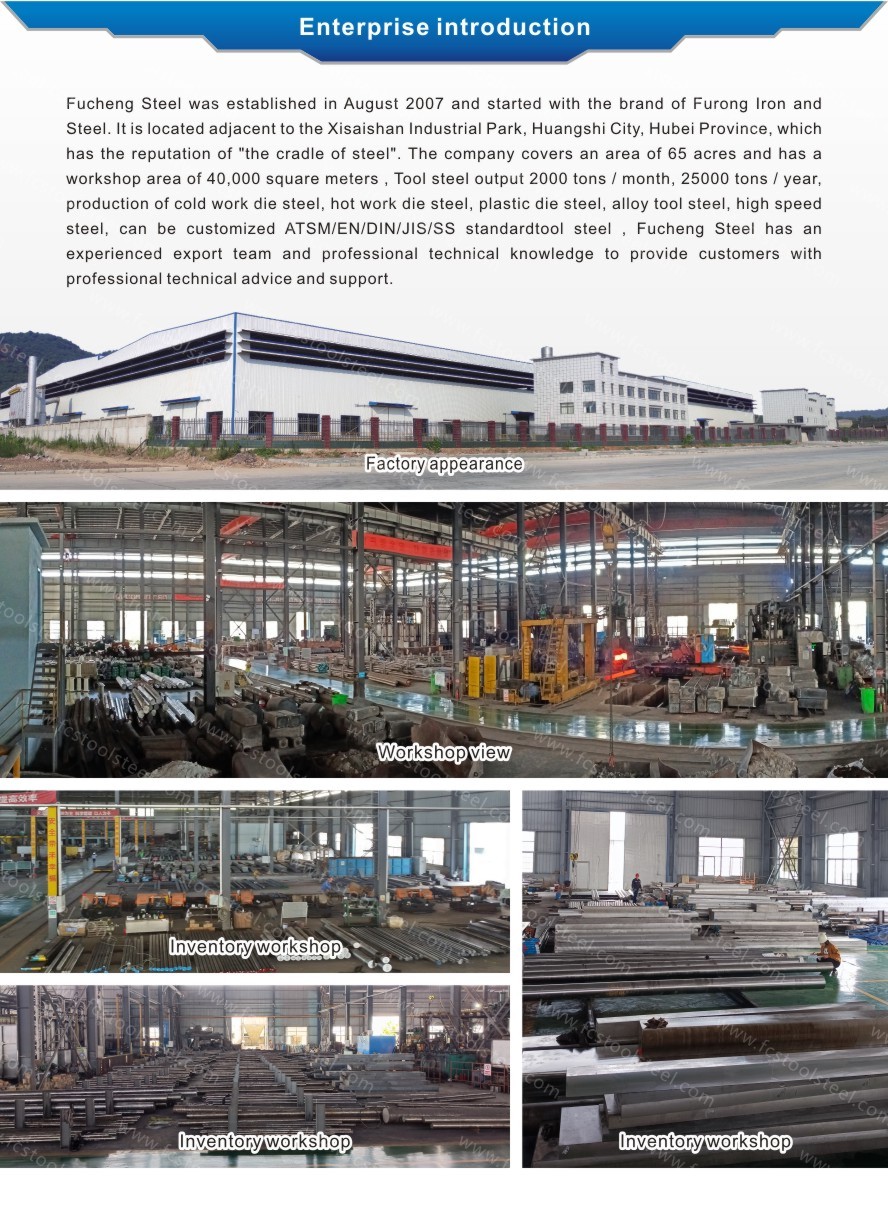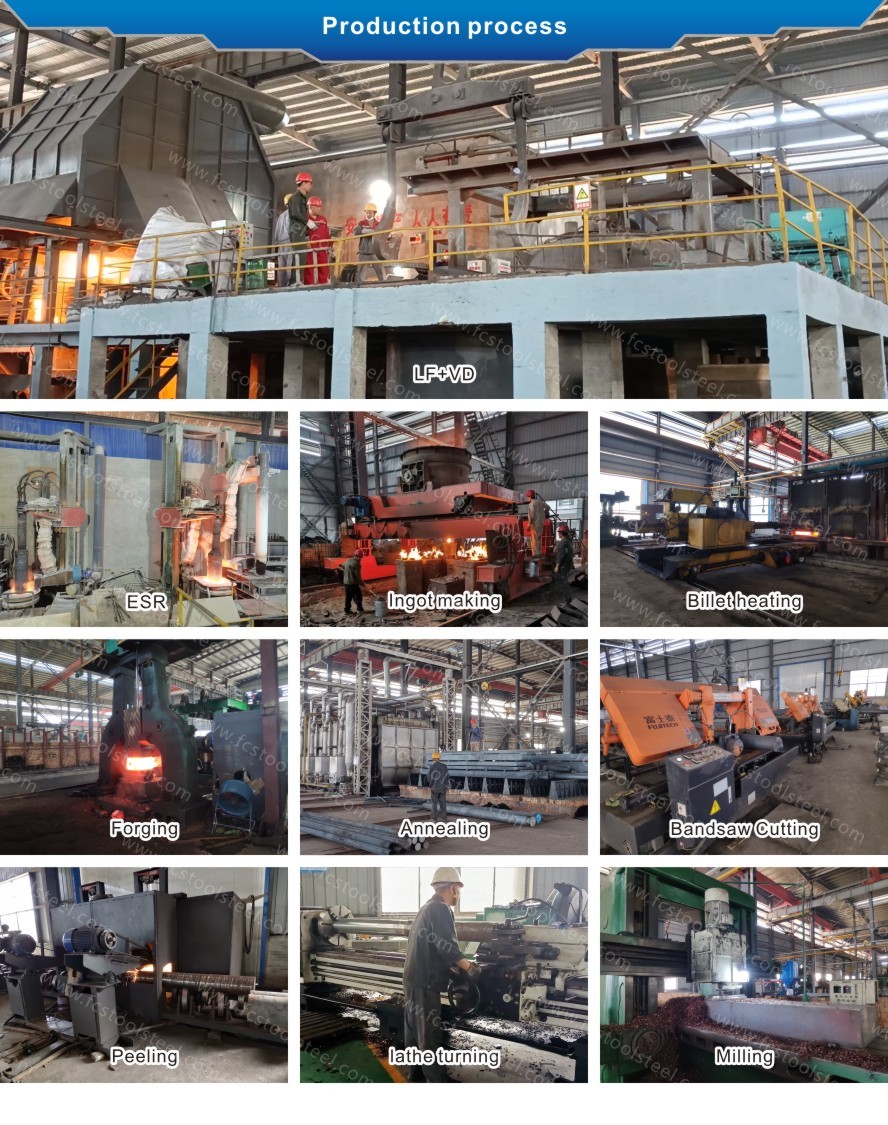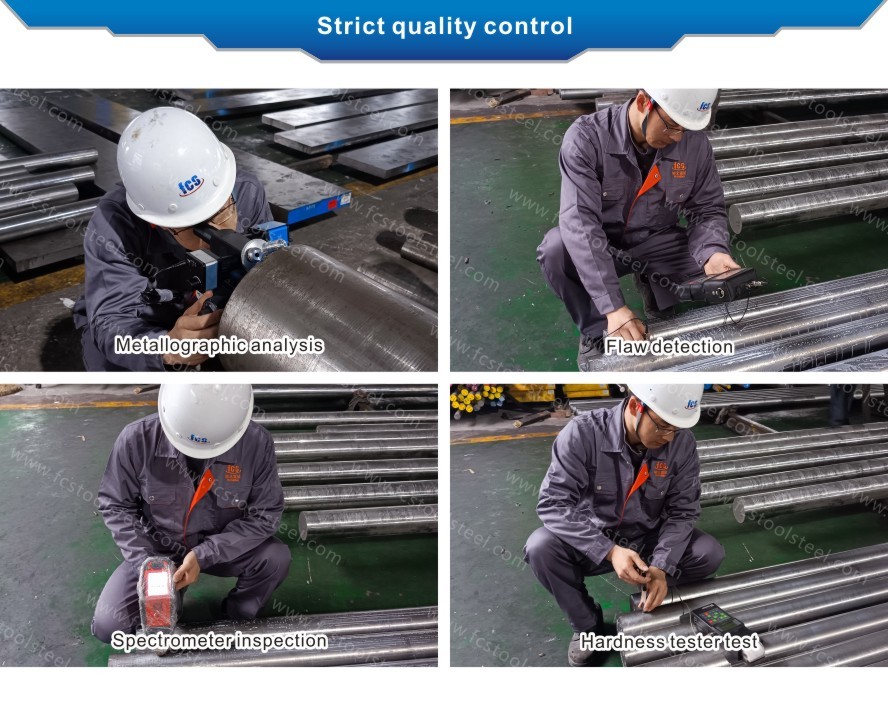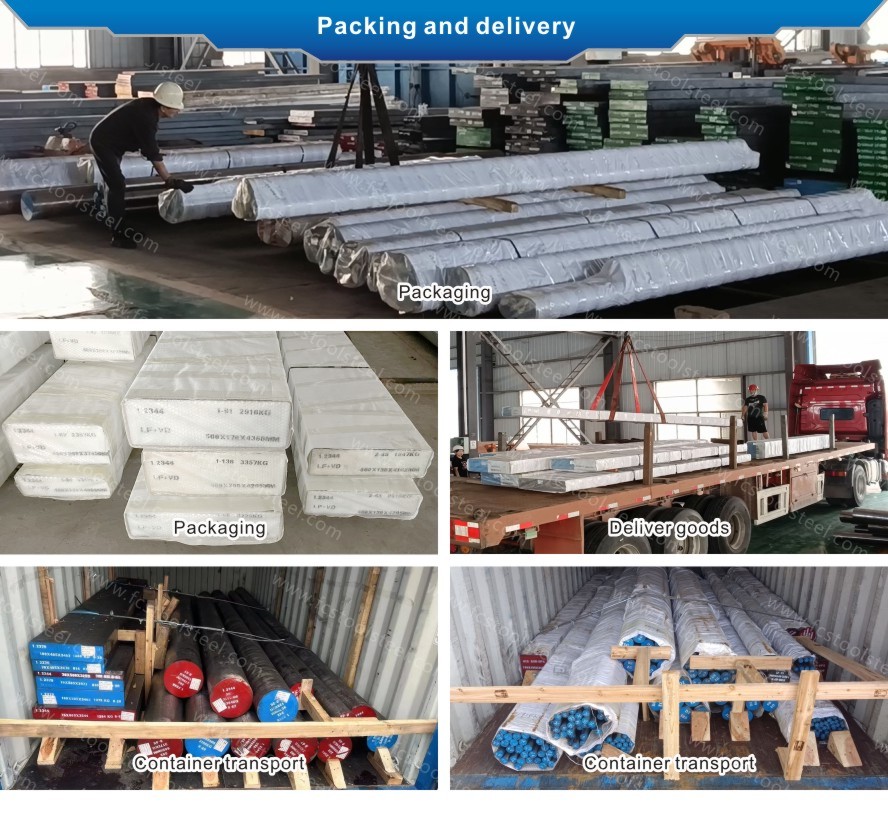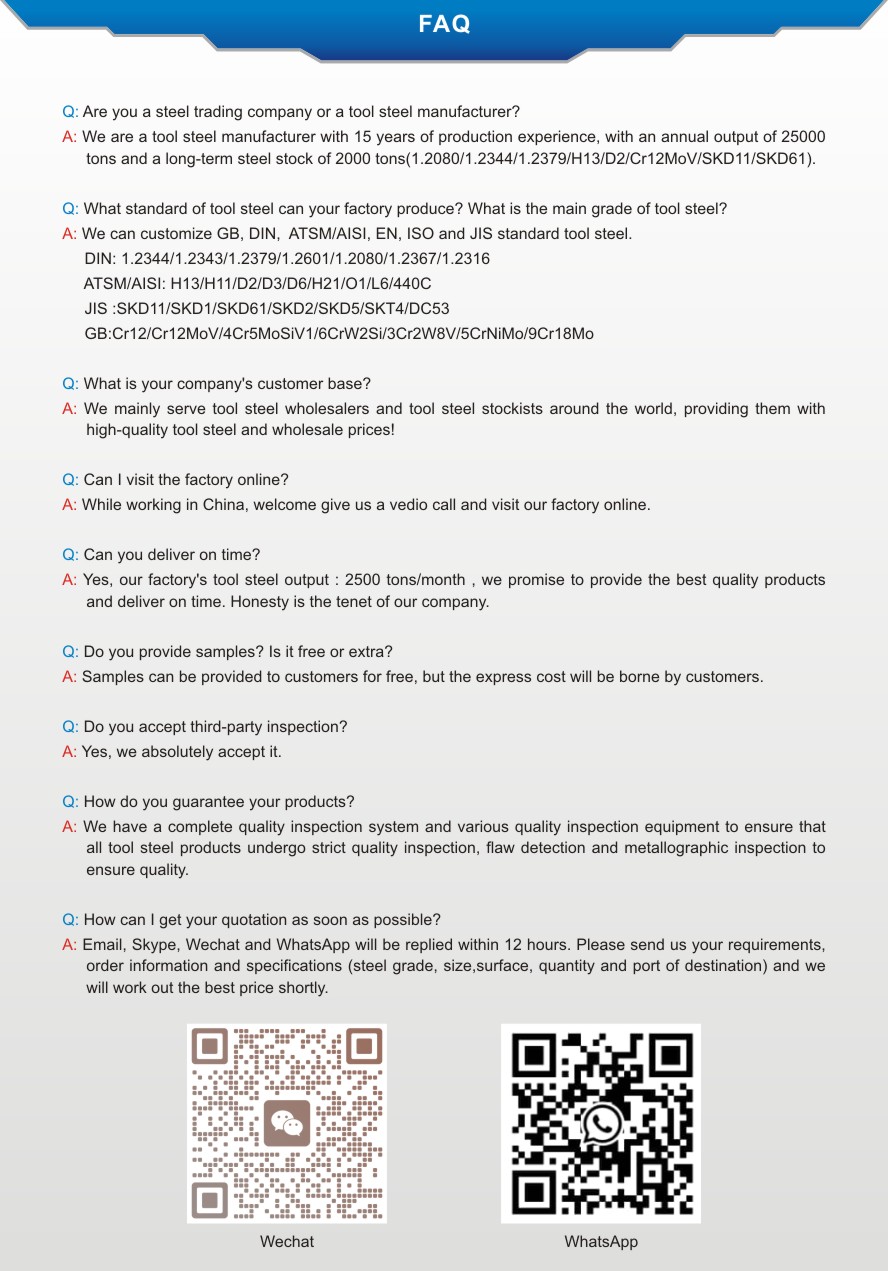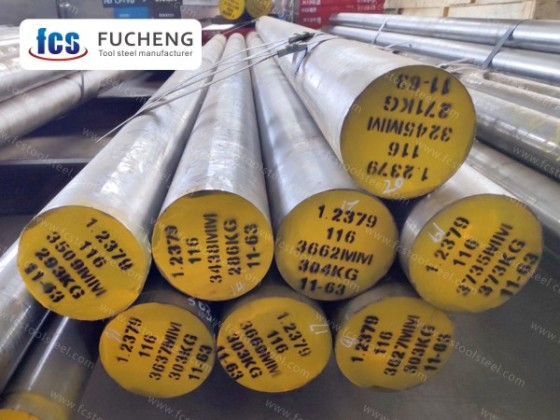
FCS 1.2358 szerszámacél
Az 1.2358-as öntőforma acél kiváló kopásállósággal és jó feldolgozási teljesítménnyel rendelkezik, és széles körben használják olyan ipari területeken, mint az autóalkatrészek sajtolóformái, fröccsöntőformái, precíziós nyírópengék és 600 ℃ alatti hőmérsékletű (bevonatot igénylő) melegkovácsoló formák. Az 1.2358-as acél különösen alkalmas nagy pontosságú és nagy terhelésű öntőformák gyártási követelményeihez.
- FUCHENG STEEL
- Kína
- 1 hónap
- 2500 tonna/hónap
- információ
- videó
1.2358 TOOL STEEL
| Brand | FCS |
| Smelting and Manufacture Method: | LF+VD+Forged |
| Delivery Condition: | Annealed |
| Delivery hardness: | ≤229 HBS |
| UT Test Standard: | Sep 1921-84 Class3 D/d,E/e |
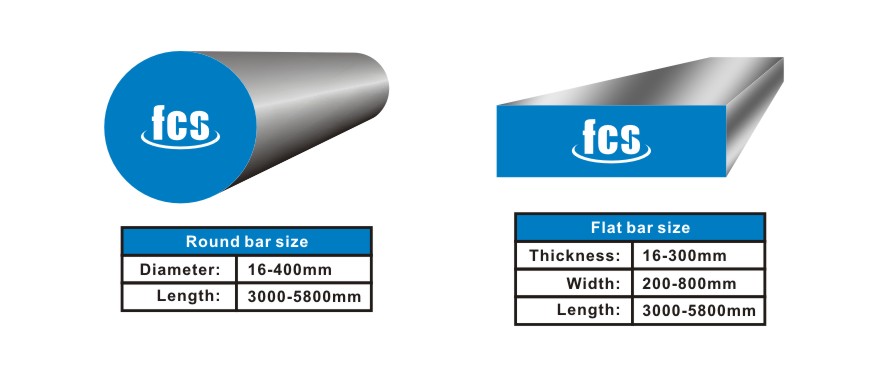
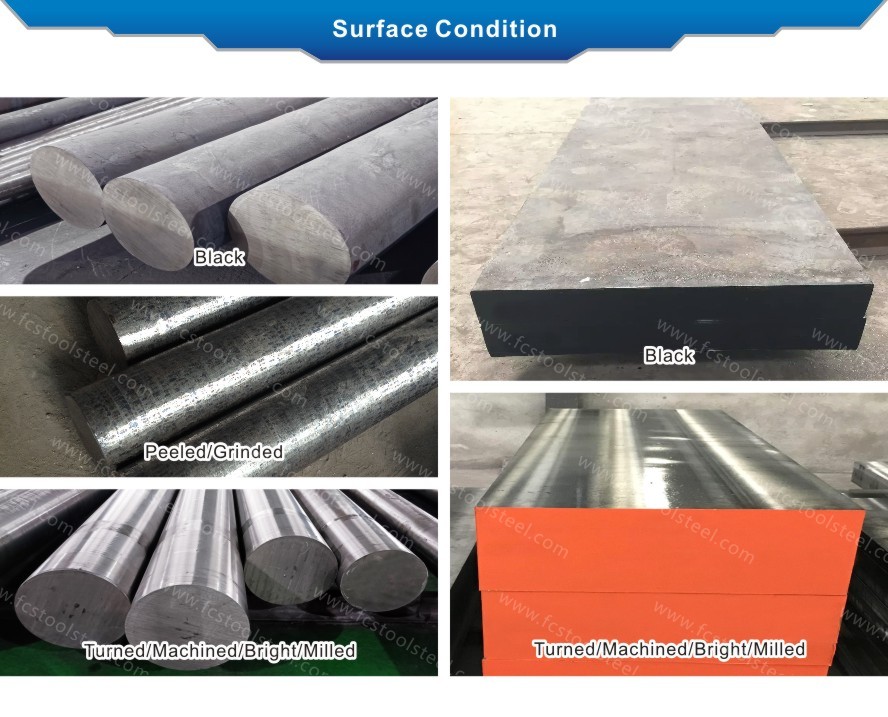
1.2358 STEEL GRADE COMPARISON AND CHEMICAL COMPOSITION COMPARISON
| Standard/Steel Grade | Chemical Composition(%) | ||||||
| C | Si | Mn | Cr | Mo | V | ||
| DIN/W-Nr. | 1.2358 | 1.28~1.62 | 0.15~0.38 | 0.30~0.50 | 10.50~12.00 | 0.55~0.95 | 0.52~0.92 |
APPLICATION
1.2358 steel is the preferred material for aluminum/magnesium alloy die-casting molds, especially suitable for the production of complex components such as automotive engine cylinder blocks and gearbox housings. The heat-resistant fatigue characteristics of 1.2358 steel can withstand the repeated impact of molten metal at 800 ℃, and the mold life is 2-3 times longer than that of ordinary materials, while maintaining dimensional stability within 0.05mm.
1.2358 steel is used in the manufacturing of automobile forgings such as crankshafts and connecting rods. With a hardness of 50-54HRC and a high temperature strength of ≥ 1000MPa, this material effectively resists mechanical stress and thermal shock during the forging process. Typical applications of 1.2358 steel include precision forging die inserts, hot stamping dies, etc. After a single mold repair, it can complete 150000 to 200000 forging processes.
For injection molding of glass fiber reinforced engineering plastics such as PEEK and PA66, the polishing performance (Ra ≤ 0.1 μ m) and corrosion resistance of 1.2358 steel can avoid melt sticking to the mold, especially suitable for precision manufacturing scenarios such as optical lens mold cores and medical device molds.
1.2358 Steel Characteristics
1.2358 steel is a chromium molybdenum vanadium alloy hot work die steel, which has become a core material in hot work fields such as die-casting and forging due to its excellent high-temperature strength and thermal fatigue resistance. The composition design of 1.2358 steel takes into account both hardness and toughness, and is suitable for high temperature conditions of 500-600 ℃.
1.2358 steel forms a strengthening phase through a martensitic matrix and uniformly distributed MC type carbides (such as VC and Mo2C), and after quenching and tempering, a fine-grained structure is formed. The grain size of 1.2358 steel can be controlled within ASTM grades 8-10, and the carbide size is ≤ 2 μ m. This microstructure endows the material with excellent thermal cracking resistance and dimensional stability.
1.2358 steel is quenched in oil at 1020-1050 ℃ and tempered multiple times (recommended 560-580 ℃), with a final hardness of 50-54HRC. The preheating stage requires stepwise heating to avoid cracking, and slow cooling after tempering can reduce residual stress.
1.2358 steel maintains excellent tensile strength (≥ 1000MPa at 600 ℃) at high temperatures, and its impact toughness is significantly better than ordinary hot work steel. Its thermal conductivity and thermal expansion coefficient are suitable for the thermal cycling requirements of molds.
The annealed hardness of 1.2358 steel is about 230HB, which is convenient for cutting and electrical machining; The surface roughness after polishing can reach Ra0.1 μ m, suitable for mirror mold manufacturing. Nitriding treatment can further enhance surface wear resistance.
